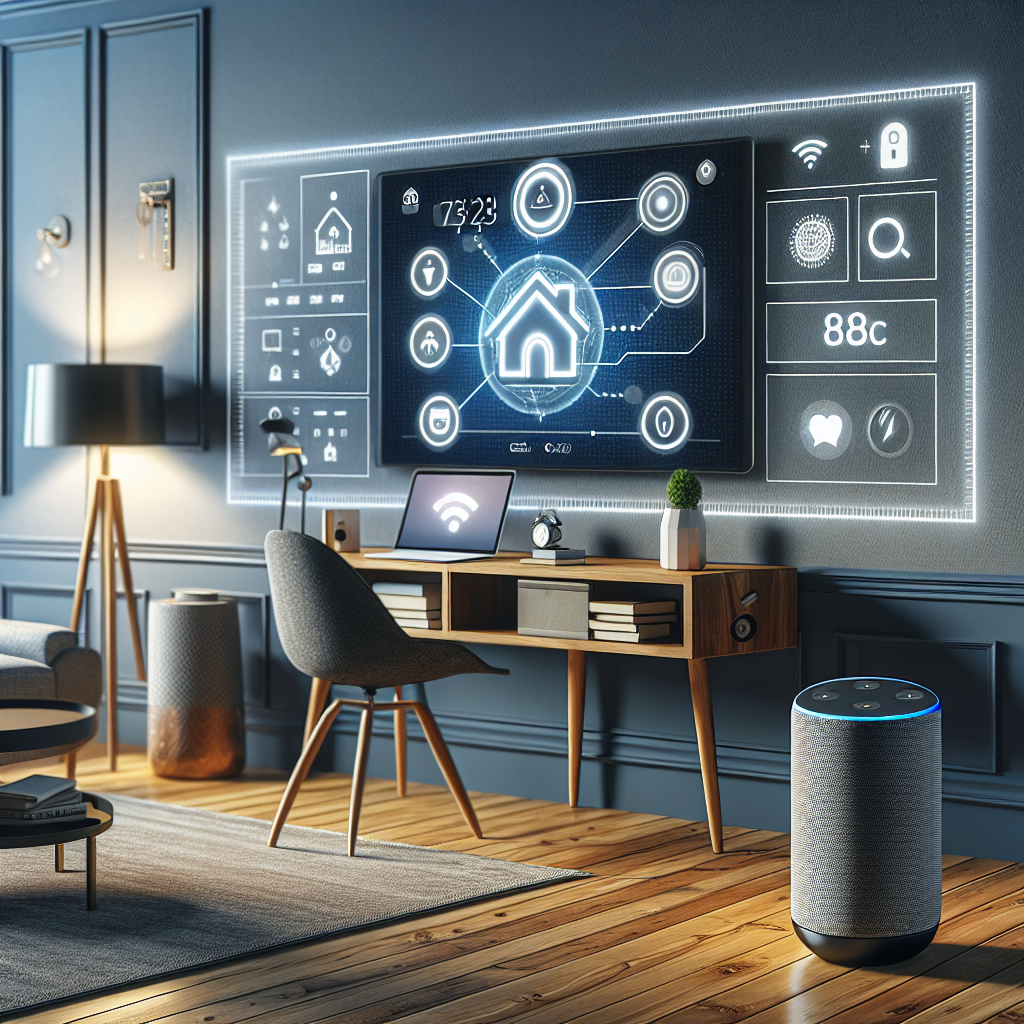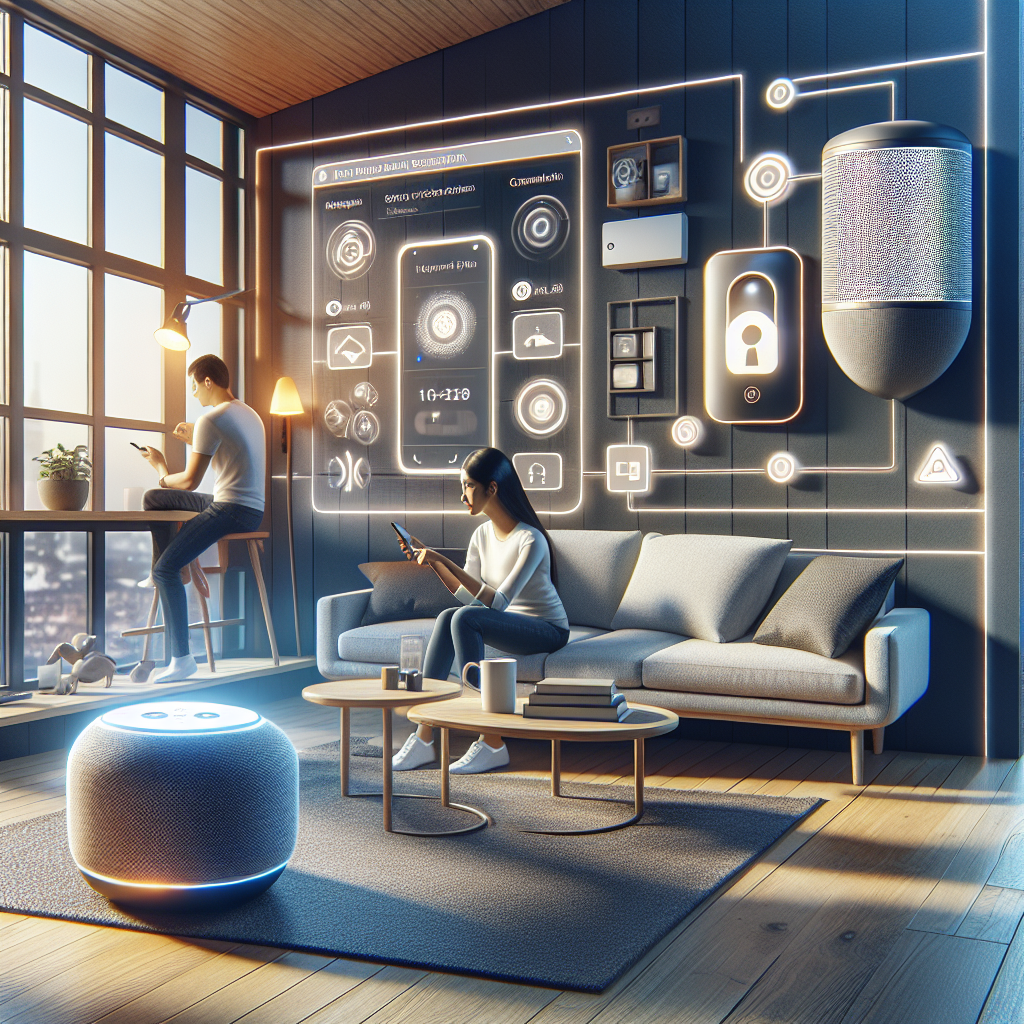Imagine coming home to a house that not only keeps you safe but also responds to your every command with just the sound of your voice. That’s the magic of a Smart Home Security System with Smart Speaker Compatibility. This cutting-edge technology seamlessly integrates security features with the convenience of smart speakers, allowing you to monitor your home, control your devices, and even receive alerts all through the power of speech. Say goodbye to fumbling with keys or scrolling through apps – with this system, your home becomes an intelligent, responsive sanctuary that works effortlessly to keep you secure and connected.
Understanding Smart Home Security Systems

Definition of Smart Home Security Systems
-
Features and components
- Smart home security systems are innovative technological solutions that integrate security features into the home environment.
- These systems typically consist of various devices such as cameras, sensors, alarms, and control panels that work together to protect the home from intruders and other potential threats.
- The devices within a smart home security system are interconnected through a central hub or control unit, allowing for seamless communication and monitoring.
-
Benefits of smart home security systems
- One of the key benefits of smart home security systems is the ability to remotely monitor and control the security of the home.
- Users can access live video feeds from security cameras, receive alerts about suspicious activity, and even arm or disarm the system from anywhere using a smartphone or compatible smart speaker.
- Smart home security systems provide peace of mind to homeowners by offering real-time updates and notifications about the status of their home security, even when they are away.
Evolution of Home Security Systems
Understanding Smart Home Security Systems
The evolution of home security systems has seen a significant shift from traditional methods to more advanced and interconnected smart systems. This transformation has been primarily driven by the integration of cutting-edge technologies into the realm of home security, allowing for enhanced protection and convenience for homeowners.
- Traditional vs. Smart Home Security Systems
In the past, traditional home security systems typically consisted of basic alarms and monitoring services. These systems were often standalone and had limited capabilities beyond alerting homeowners or authorities in case of a breach. However, with the advent of smart home technology, security systems have become more sophisticated and interconnected.
- Integration of Technology in Home Security
The integration of technology in home security has revolutionized the way we protect our homes. Smart home security systems now leverage advanced features such as motion sensors, video surveillance, and remote access through mobile apps. These systems can be seamlessly integrated with other smart devices in the home, creating a comprehensive network that enhances both security and convenience.
Importance of Smart Speaker Compatibility
Role of Smart Speakers in Home Security
-
Hands-free control and monitoring: Smart speakers enable users to control and monitor their home security system using voice commands. This hands-free capability allows for quick and convenient access to security features without the need to physically interact with a control panel or smartphone. For example, users can arm or disarm their security system, check the status of sensors, or even receive real-time alerts simply by speaking to their smart speaker.
-
Integration with other smart devices: Smart speakers serve as a central hub for integrating various smart devices within a home security system. By connecting smart cameras, door locks, motion sensors, and alarms to a smart speaker, users can create a seamless network of interconnected devices that work together to enhance home security. This integration enables users to receive notifications from different devices through the smart speaker, allowing for a comprehensive and unified approach to monitoring and controlling home security.
Advantages of Smart Speaker Compatibility
-
Effortless Control: With smart speaker compatibility, users can effortlessly control their home security system using just their voice. This hands-free approach eliminates the need to manually interact with the security system through buttons or apps, providing a convenient and user-friendly experience.
-
Enhanced Accessibility: Smart speaker compatibility enhances the accessibility of the home security system, allowing users to easily arm or disarm the system, check the status of sensors, or receive real-time alerts simply by speaking commands to the smart speaker. This accessibility is particularly beneficial for individuals with mobility issues or those who prefer a more intuitive interface.
-
Integration with Smart Home Ecosystem: By integrating smart speaker compatibility into the home security system, users can enjoy a seamless experience within their smart home ecosystem. This means that they can not only control security functions but also integrate them with other smart devices in their home, such as smart lights, cameras, and door locks, creating a comprehensive and interconnected smart home environment.
-
Hands-Free Security Monitoring: Smart speaker compatibility enables hands-free security monitoring, allowing users to check on their home’s security status from anywhere in the house. Whether they are in the kitchen cooking dinner or relaxing in the living room, users can easily inquire about the status of their security system or receive instant alerts in case of any security breaches, all without lifting a finger.
-
Customizable Voice Commands: With smart speaker compatibility, users can personalize and customize voice commands to suit their preferences. This level of customization enables users to create unique commands for different security scenarios, making it easier to navigate and control the security system according to their specific needs and routines.

Enhancing Home Security with Smart Speaker Integration
Remote Monitoring and Control
Smart home security systems with smart speaker compatibility offer the convenience of remote monitoring and control through seamless integration with voice commands. By utilizing smart speakers such as Amazon Echo or Google Home, homeowners can effortlessly check on their security cameras and sensors from anywhere in the house by simply issuing voice prompts. This feature enables individuals to stay informed about their home’s security status without the need to physically access a control panel or a mobile app.
Moreover, the ability to lock doors and windows remotely adds an extra layer of security and peace of mind. In case a homeowner forgets to lock a door or window before leaving the house, they can easily remedy the situation by instructing their smart speaker to secure the entry points. This functionality not only enhances the overall security of the home but also provides a sense of control and reassurance to the occupants, knowing that they can remotely address security concerns with a simple voice command.
Voice-Activated Alerts and Notifications
Voice-activated alerts and notifications play a crucial role in enhancing the functionality and effectiveness of smart home security systems that are compatible with smart speakers. By leveraging the capabilities of voice recognition technology, these systems can provide users with real-time updates on security breaches and potential threats in their homes.
-
Real-time updates on security breaches: Through seamless integration with smart speakers, homeowners can receive instant notifications regarding any suspicious activities detected by their security system. This immediate alert system ensures that users are promptly informed of any potential risks, allowing them to take necessary actions to secure their property.
-
Customizable alerts for different security scenarios: One of the key advantages of integrating smart speakers with home security systems is the ability to customize alerts based on specific security scenarios. Users can set up personalized notifications for various events, such as motion detection, door/window openings, or even fire and carbon monoxide alarms. This tailored approach enables homeowners to stay informed about the security status of their property in a way that suits their individual preferences and needs.
Addressing Security Concerns and Misconceptions
Privacy and Data Security
- Encryption protocols for secure data transmission
In a smart home security system with smart speaker compatibility, ensuring the privacy and security of data is paramount. Encryption protocols play a crucial role in safeguarding sensitive information transmitted between devices. By utilizing strong encryption algorithms, such as AES (Advanced Encryption Standard), data can be securely scrambled during transmission, making it extremely difficult for unauthorized parties to intercept and decipher.
- User permissions and access control
Another key aspect of privacy and data security in a smart home security system is the implementation of robust user permissions and access control mechanisms. By assigning specific permissions to users based on their roles and responsibilities within the household, the system can restrict access to sensitive data and functionalities. This ensures that only authorized individuals can control and monitor the smart home security system, minimizing the risk of unauthorized access or misuse of personal information.
Reliability and False Alarms
g Security Concerns and Misconceptions
In the realm of smart home security systems, addressing reliability and minimizing false alarms is paramount to ensuring the effectiveness of the overall security measures in place. Leveraging advancements in technology, particularly in the realm of voice recognition, has proven to be a game-changer in this regard.
- Voice Recognition Technology:
-
By incorporating voice recognition technology into smart home security systems, the likelihood of false alarms triggered by pets, sudden movements, or other innocuous activities is significantly reduced. This technology enables the system to differentiate between authorized individuals and potential threats, thereby enhancing the overall reliability of the security setup.
-
Backup Systems:

- Another key aspect in ensuring reliability is the implementation of robust backup systems. These systems are designed to kick in seamlessly in the event of power outages, internet connectivity issues, or other disruptions that could potentially compromise the security monitoring process. By having backup mechanisms in place, smart home security systems can maintain uninterrupted surveillance and protection, bolstering their overall reliability and effectiveness.
Future Trends in Smart Home Security
Artificial Intelligence in Home Security
Artificial Intelligence (AI) is revolutionizing the field of home security with its ability to enhance the effectiveness of smart home security systems. By leveraging AI technologies, smart home security systems can now go beyond traditional reactive measures to adopt proactive security measures that anticipate and prevent potential threats.
-
Predictive analytics for proactive security measures: AI-powered smart home security systems can analyze patterns and data to predict potential security risks before they occur. By utilizing advanced algorithms, these systems can identify suspicious activities, such as unusual movements or access attempts, and alert homeowners in real-time. This predictive capability enables homeowners to take preemptive actions to secure their homes effectively.
-
Adaptive learning algorithms for personalized security responses: AI enables smart home security systems to adapt and learn based on the homeowner’s behavior and preferences. These systems can analyze user interactions with the security system, such as arming and disarming schedules, to create personalized security responses. For example, if the system detects a deviation from the usual routine, it can send customized alerts or adjust security settings accordingly. This adaptive learning capability enhances the overall security posture of the smart home by tailoring responses to specific user needs.
Integration with Smart Cities
In the realm of smart home security systems, the integration with smart cities is a burgeoning trend that holds immense potential for enhancing overall safety and security measures within urban environments. This integration involves collaborative security initiatives between smart home technology providers and local authorities to create a more interconnected and responsive network of surveillance and monitoring capabilities.
-
Collaborative security initiatives with local authorities: By partnering with municipal law enforcement agencies and emergency responders, smart home security systems can leverage real-time data and alerts to facilitate quicker and more targeted responses to potential security threats. This collaboration allows for seamless communication between smart home devices and city-wide security infrastructure, enabling a more comprehensive approach to crime prevention and incident management.
-
Utilizing smart home data for community safety measures: One of the key advantages of integrating smart home security systems with smart cities is the ability to aggregate and analyze data from various sources to identify patterns and trends related to criminal activity or safety concerns. By harnessing the power of artificial intelligence and machine learning algorithms, these systems can proactively detect anomalies and potential risks, thereby enabling proactive measures to mitigate security threats before they escalate.
In essence, the integration of smart home security systems with smart cities represents a paradigm shift in how we approach urban safety and security, fostering a more interconnected and data-driven ecosystem that prioritizes proactive risk mitigation and rapid response capabilities.
FAQs for Smart Home Security System with Smart Speaker Compatibility
What makes a smart home security system compatible with smart speakers?
A smart home security system that is compatible with smart speakers allows users to control and monitor their security devices using voice commands through the smart speaker. This integration allows for seamless communication between the security system and the smart speaker, enhancing the overall convenience and accessibility of the system.
How can I set up my smart home security system with a smart speaker?
Setting up a smart home security system with smart speaker compatibility typically involves connecting the security devices to the smart speaker’s platform or app. This may require installing specific skills or apps on the smart speaker, as well as configuring the devices to communicate with each other. Follow the manufacturer’s instructions for a smooth setup process.
What are some common features of smart home security systems with smart speaker compatibility?
Common features of smart home security systems with smart speaker compatibility include the ability to arm and disarm the system, receive real-time alerts and notifications, view live camera feeds, and control other connected devices (such as smart locks or lights) using voice commands through the smart speaker. Integration with voice assistants like Amazon Alexa or Google Assistant also allows for hands-free control of the security system.
Are there any privacy concerns with using a smart home security system with smart speaker compatibility?
Privacy concerns may arise when using a smart home security system with smart speaker compatibility, as the devices may collect and process personal data to function effectively. It is important to review the privacy policies of the system and smart speaker manufacturers to understand how your data is being accessed and protected. Take necessary precautions such as setting up secure passwords and regularly updating software to safeguard your privacy.
